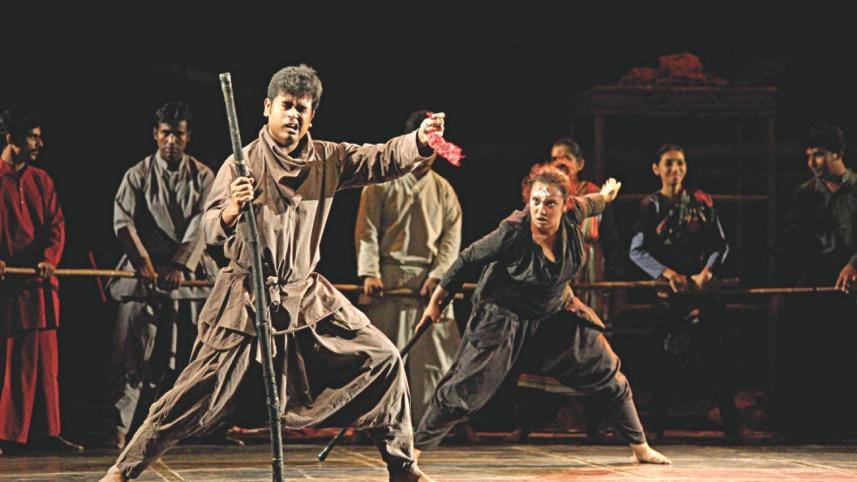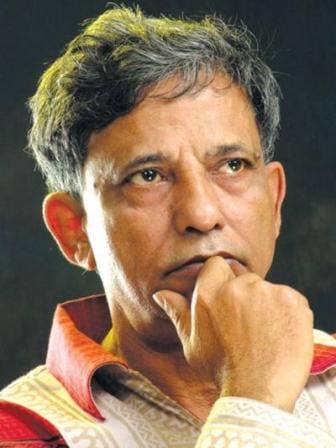Dhaka Theatre's Selim Al Deen Festival begins

Dhaka Theatre's six-day Selim Al Deen Festival opened yesterday at the Bangladesh Shilpakala Academy, featuring an array of plays and other programmes.
The opening day of the festival included a journey to the master playwright's grave at Jahangirnagar University (JU), and a seminar at the Bangaldesh Shilpakala Academy (BSA) where noted academic Salimullah Khan presented a paper.
The second's day's programmes today will include a children's painting competition, and the formal inauguration of the festival at BSA's National Theatre Hall. Professor Dr. Farzana Selim, Vice Chancellor, JU, will be the chief guest at the ceremony. A number of awards – including the Selim Al Deen Award 2017, Mir Maksudus Salehin-Bazlul Karim Award, Fawzia Yasmin Shibly Award and prizes for the painting competition will be handed at the event. Preeminent thespian Aly Zaker will be the recipient of the Selim Al Deen Award. Dhaka Theatre will stage their play "Dhaboman", written by Selim Al Deen and directed by Shimul Yousuff, on the day.

The other plays to be staged at the festival subsequently are "Chandrabari Kotha" by Kushtia's Bodhon Theatre, written by Aslam Ali and directed by Shamim Sagor (at National Theatre Hall); "Rupchan Sundori'r Pala" by Bongalok Dhaka (at Studio Theatre Hall); "Nimojjon" by Dhaka Theatre, written by Selim Al Deen and directed by Nasiruddin Yousuff (National Theatre Hall); "Swopnoromonigon" by JU's Theatre and Dramatics department, written by Selim Al Deen and directed by Dr. Afsar Ahmed; and "Neelakhyan" by Mohakala Natya Sampraday, written by Anon Zaman based on Kazi Narul Islam's "Sapurey" and directed by Yusuf Hasan Orko. Apart from "Rupchan Sundori'r Pala" (which will be staged at Studio Theatre Hall), all other plays will be staged at National Theatre Hall.
The festival is being organised by Dhaka Theatre, Bangladesh Gram Theatre and Selim Al Deen Foundation, with assistance from BSA.
Natyacharya Selim Al Deen is perhaps the most celebrated name of Bangladeshi theatre in post-Rabindranath era, and is credited with ushering in a new era in our theatre scene trough his plays and extensive research in the field. Born on August 18, 1949 in Feni, he was attracted to Bangla literature at a young age, and with encouragement from Munier Chowdhury, focused on theatre. Selim Al-Deen's most important contribution to Bangla theatre is his research into its roots. He was of the view that the history of Bengali drama is older than that of European drama. He introduced epic realism in Bengali literature, and several of his works including "Bashon", "Atotayi", "Keramat Mangal", "Hat Hodai" and "Chaka" follow this pattern. He also brought out the folklore tradition called Katha-natya in his dramas "Joiboti Koinnar Mon" and "Hargaj". Selim Al-Deen also revived Mymensingh Geetika, and penned a few plays following the pattern. To pursue his love of theatre, he founded the Drama and Dramatics Department at Jahangirnagar University. He was one of the founding members of Dhaka Theatre that played a vital role in the progressive theatre movement of post-Liberation Bangladesh.



 For all latest news, follow The Daily Star's Google News channel.
For all latest news, follow The Daily Star's Google News channel.
Comments